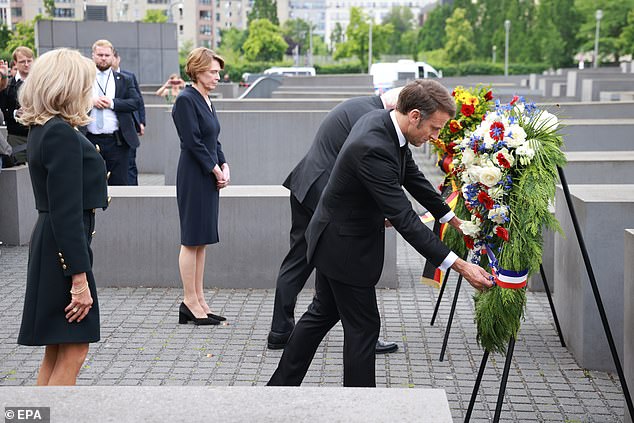France’s first lady Brigitte Macron shared a joke with her German counterpart as the couple accompanied their husbands to a wreath-laying ceremony at Berlin’s Holocaust Memorial on Monday morning.
French President Emmanuel Macron laid a wreath at the site of the monument to the six million Jews who died at the hands of the Nazis during World War II alongside his wife, as well as German President Frank-Walter Steinmeier and his partner, Elke Budenbender.
As the couples walked across the concrete blocks that make up the monument, Brigitte and Budenbender were seen holding hands and laughing as they headed to the ceremony.
Macron made the gesture as part of his state visit to Germany, the first presidential visit by a French leader in 24 years. The laying of the wreath took place at the beginning of the second day of the trip.
The monument is located near the Brandenburg Gate in the German capital. Macron and Steinmeier took turns laying wreaths of flowers wrapped in each nation’s colors.
French President Emmanuel Macron pictured at the wreath-laying ceremony in Berlin on Monday morning.
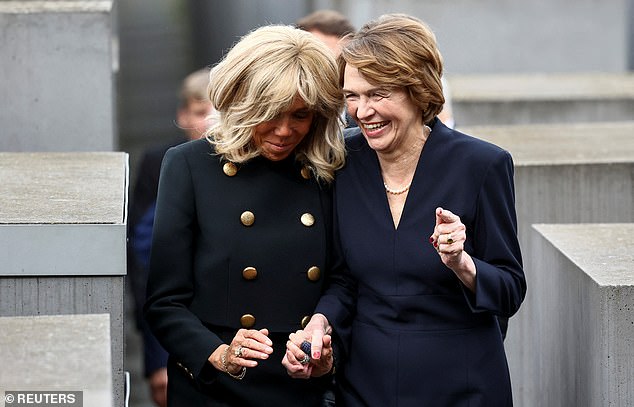
The First Lady of France and Brigitte Macron and the First Lady of Germany, Elke Buedenbender, holding hands as they walk past the memorial to the six million people murdered by Nazi Germany during World War II.
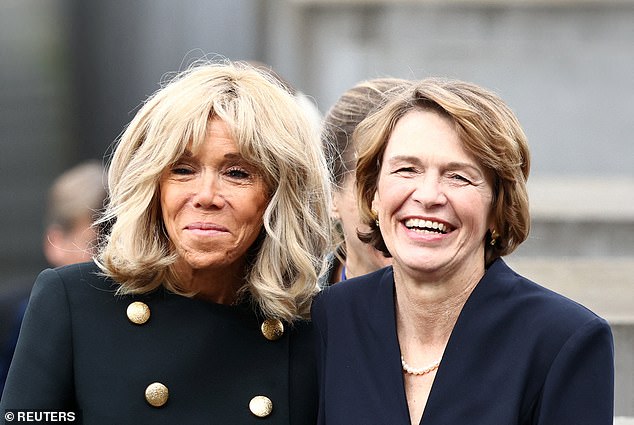
First Lady Elke Budenbender is a member of the board of directors of the Germany-Israel Future Forum
After a brief ceremony, the two couples entered the attached museum commemorating the six million people murdered by Nazi Germany during World War II.
The visit will be seen as a health check of the Franco-German relationship that drives EU policymaking, at a time of great challenges for Europe, from the war in Ukraine to the possible election of Trump in the United States.
“This state visit comes at a key moment for Europe,” Macron said, pointing to the war in Ukraine, among other challenges.
“We have to confront an imperialist desire in Europe… this means strengthening Franco-German relations,” he told reporters after being received by his German counterpart Steinmeier at the presidential palace, Schloss Bellevu.
Steinmeier, who plays a largely ceremonial role, said Germany and France can overcome the geopolitical challenges facing Europe, such as Russia’s war in Ukraine, the war in Gaza and the US elections if the two countries work together.
Macron and German Chancellor Olaf Scholz have very different leadership styles and have clashed publicly on issues ranging from defense to nuclear energy since the latter took power in late 2021.
However, they have lately reached compromises on several fronts, from tax reform to changes in energy market subsidies, allowing the EU to close deals and form a more united front.
“There are tensions in the Franco-German relationship, but partly precisely because they have addressed some difficult issues,” said Yann Wernert at the Jacques Delors Institute in Berlin, noting that the two countries had also converged on the need to expand the EU towards the this. .
The visit is “an attempt at the highest political level to demonstrate that the relationship is working,” said Mujtaba Rahman, European director general at the Eurasia Group think tank.
“But there are still fundamental gaps on important issues looming over the EU.”
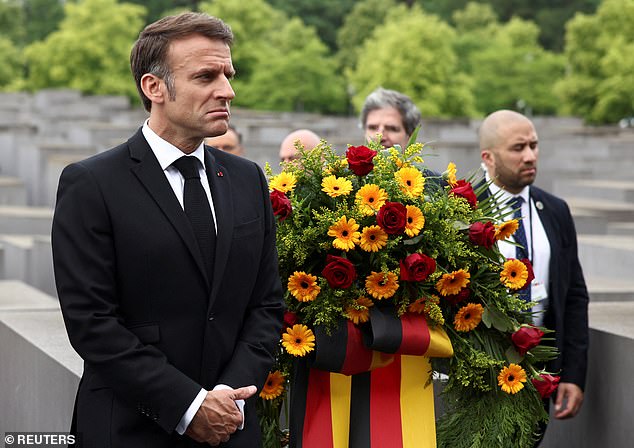
After a brief ceremony, the two couples entered the attached museum commemorating the six million people murdered by Nazi Germany during World War II.
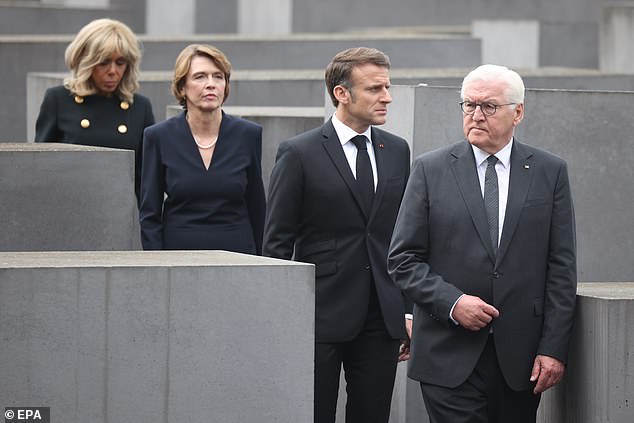
Macron’s visit was originally scheduled for last July but was postponed at the last minute due to unrest in France following the killing of a 17-year-old boy by police.
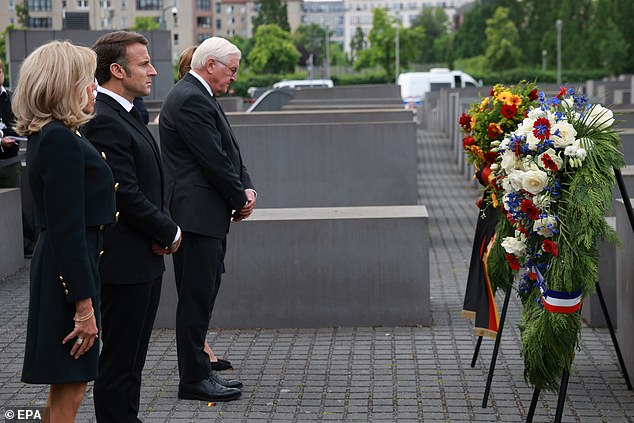
While Macron frequently visits Germany as Paris and Berlin try to coordinate their positions on the EU and foreign policy, this is the first state visit in full pomp since Jacques Chirac’s arrival in 2000.
A key gap is European defense, particularly if Trump wins the November 5 election. Defense experts see him as a much less predictable ally for Europe than his Democratic rival, President Joe Biden.
Earlier this year, the former Republican president not only said he would not protect NATO members from a future attack by Russia if those countries’ contributions to the defense alliance were delayed, but that he would encourage Russia to “do whatever I wanted.”
Nuclear-armed France has pushed for a more defense self-sufficient Europe and has been aggrieved by Germany’s decision to buy primarily American equipment for its European Sky Shield Initiative air defense umbrella.
Germany says there is no credible alternative to the US military umbrella and that Europe does not have time to wait for a local defense industry to be prepared for threats such as Russian hostility.
After meeting with Steinmeier, Macron, accompanied on his trip by his wife Brigitte, will walk through the emblematic Brandenburg Gate with the city’s mayor, Kai Wegner.
On Monday he will travel to Dresden, where he will give a speech in front of the Frauenkirche, destroyed by the Western Allies during World War II, before traveling to Münster on Tuesday.
But perhaps the most significant part of their trip will be Tuesday’s cabinet meeting in Meseberg, outside Berlin, where the two governments will get to work seeking common ground on the two main issues they have struggled to see. : in the spotlight: defense and competitiveness.
The two countries will also try to find common ground on the EU agenda for the next five years, in view of the expected strong result of the far right in the parliamentary elections on June 6-9, which will make decision-making difficult. The EU.
Rahman said the EU would have a clear window to press ahead with more ambitious plans, between parliamentary elections and the establishment of the new leadership, and next summer before the German elections.
This would be especially important if Trump won the election, he said.

